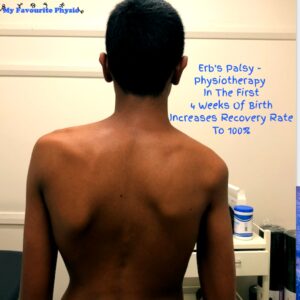16 Feb Did you know that if treatment begins within the first four weeks of birth, the rate of recovery for Erb’s Palsy increases to nearly 100% 🧐

For every 1,000 live births,![]() approximately 0.9 to 2.6 cases of Erb’s palsy occur. Erb’s palsy is a condition whereby there is paralysis of the muscles of the upper arm and shoulder girdle due to an injury to the upper part of the brachial plexus nerves to the arm.
approximately 0.9 to 2.6 cases of Erb’s palsy occur. Erb’s palsy is a condition whereby there is paralysis of the muscles of the upper arm and shoulder girdle due to an injury to the upper part of the brachial plexus nerves to the arm. ![]() Erb’s Palsy is often a result of traumatic birth when a doctor pulls on the infant out of the birth canal quickly either in a breech or normal delivery, this puts significant pressure on the child’s shoulders which can lead to damage in the nerves or muscles associated with the shoulder, arm, hands and fingers.
Erb’s Palsy is often a result of traumatic birth when a doctor pulls on the infant out of the birth canal quickly either in a breech or normal delivery, this puts significant pressure on the child’s shoulders which can lead to damage in the nerves or muscles associated with the shoulder, arm, hands and fingers.![]()
Erb’s palsy is not considered a permanent condition. It is estimated that over 80% of children ![]() suffering from Erb’s palsy will make a full recovery. If treatment begins within the first four weeks of birth, the rate of recovery increases to nearly 100%. In virtually all cases, the first course of action is physiotherapy
suffering from Erb’s palsy will make a full recovery. If treatment begins within the first four weeks of birth, the rate of recovery increases to nearly 100%. In virtually all cases, the first course of action is physiotherapy ![]() and routine evaluation. This leads to significant improvement in nearly 95% of cases.
and routine evaluation. This leads to significant improvement in nearly 95% of cases.
In the 5% of cases where physiotherapy leads to no significant improvement, surgical options are assessed. ![]() Surgery may include nerve grafts, muscle or nerve transfers or neurolysis. After surgery, the child will again continue physiotherapy. About half of the post-surgical cases will lead to a good recovery. However, the half that has no improvement likely has a permanent disability.
Surgery may include nerve grafts, muscle or nerve transfers or neurolysis. After surgery, the child will again continue physiotherapy. About half of the post-surgical cases will lead to a good recovery. However, the half that has no improvement likely has a permanent disability.![]()
Here at My Favourite Physio, our Expert Paediatric Physiotherapists![]() see many babies and children with Erb’s Palsy, and we get great outcomes.
see many babies and children with Erb’s Palsy, and we get great outcomes. ![]() Occasionally, however, we meet a child who has not been given the correct early intervention after sustaining an Erb’s Palsy Injury. The consequence is unfortunately, lifelong and significant.
Occasionally, however, we meet a child who has not been given the correct early intervention after sustaining an Erb’s Palsy Injury. The consequence is unfortunately, lifelong and significant. ![]()
If you have a newborn baby ![]() and you have been told your child has Erb’s Palsy, ring My Favourite Physio
and you have been told your child has Erb’s Palsy, ring My Favourite Physio ![]() on (02) 9790 4233 or DM us @myfavouritephysio to book an appointment for your child to be assessed. Early Intervention makes a difference!
on (02) 9790 4233 or DM us @myfavouritephysio to book an appointment for your child to be assessed. Early Intervention makes a difference!![]()
